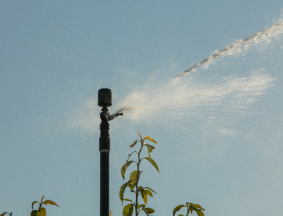When irrigating, it is important to consider the quality of the water used. To what extent water is suitable for irrigation is depends on the chloride and iron content. Too much chlorine in the water is harmful; the amount depends on the crop.
If irrigation is done with iron-containing water, such as spring water, the iron (Fe2+) can react with oxygen to form an oxidized form, a brown precipitate, and that results in leaf burning. At iron levels below 10 mg/l Fe, the damage is minor. If surface water is used, the risk of brown precipitation and leaf burning is low.
Besides chlorine and iron content, the hardness of water also plays a role, in other words the amount of calcium and magnesium the water contains. Water that is "too hard" causes blockages in pipes.

